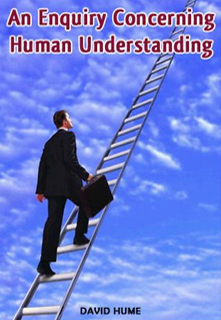
There are many, many books that seek to communicate the complex philosophical ideas of great thinkers by presenting them in language that the authors feel is easier to understand than the original works. Some of these books are very successful in doing so – the original works are sometimes written in language that requires a specialized understanding to grasp. Reading Hume’s An Enquiry Concerning Understanding, I’ve never felt the need for any other guide than Hume himself – making him one of a very small number of philosophers with this characteristic who always turn up in Great Books lists.
There are a couple of immediately apparent reasons for this. First, even though Hume is expressing ideas that are highly original, he is able to get them across without devising a new, technical vocabulary. Second, while his ideas are highly abstract, they deal to a large extent with the mental activity itself of abstraction from the world of sense perceptions. Hume is always ready for us with a concrete example; e.g., “A man, suddenly struck with a palsy in the leg or arm, or who had newly lost those members, frequently endeavors, at first, to move them, and employ them in their usual offices” – and this, in a chapter with the rather austere title, “On the Idea of Necessary Connexion”. Finally, Hume is the most conversational of philosophers – he really communicates the sense that for him, philosophy is a social activity; one can imagine him spending long evenings talking with his friends – maybe accompanied by good tobacco and brandy – about the germs of the ideas he worked out carefully in his study when alone. The Enquiry is full of remarks such as, “I was lately engaged in conversation with a friend who loves sceptical paradoxes . . .”
Hume understands that philosophy is at heart an exercise of the moral instincts of human beings and that the right theater of operations for it is among living, breathing individuals who, like all of us, are faced with making judgments and enduring their consequences every hour of the day. He incorporates this understanding into his ‘style’ of writing philosophy and in doing so, takes us by the elbow and leads us into the stratospheric but genial realm of his thoughts.
For more information and to register for Arguments Amongst Friends: Entertaining David Hume , click here.
I hope you will join me.

Latest Updates
Seminars on literature from the ancient world to today
See the world through the eyes of visionary writers and artists
An annual gathering of lifelong learners